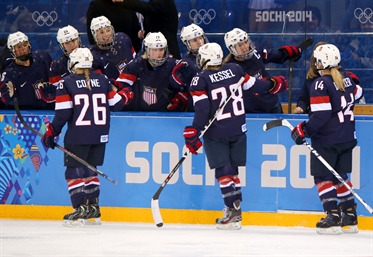Setting the golden table
Setting the golden table
Does it matter who wins CAN-USA? Yes!

 Team USA enters the battle for first place in Group A against Canada as top-ranked team. Photo: Andre Ringuette / HHOF-IIHF Images
Team USA enters the battle for first place in Group A against Canada as top-ranked team. Photo: Andre Ringuette / HHOF-IIHF Images
Imagine two opponents so close the only real difference is mental preparation and game time execution. That is the Canada-United States rivalry in women’s hockey.
Tomorrow the teams play the first of what is likely two games, the second expected to come in the gold-medal game on February 20. Seven times previously have the nations played twice in the same event, and those results are both revealing and unimportant, vital and utterly without connection. You never know.
Consider the 1998 Olympics, the maiden voyage for women’s hockey at the five-ringed circus. Canada was the prohibitive favourite, having won all four Women’s World Championships, all at the expense of the Americans. In the early game in Nagano, Canada built an impressive 4-1 lead in the third period and looked to be on its way to another victory.
But shockingly, the Americans scored six unanswered goals to win 7-3. SIX! Never before or since has Canada surrendered as many goals in 20 minutes of play. In fact, with one exception in 2012 never before or since has Canada surrendered six goals in a game.
The result was meaningless in the standings, but it was anything but meaningless in the hearts and minds of the players. In the gold-medal game, the U.S. was in control and won impressively, 3-1. Had Canada held on and won the preliminary game, 4-1, it’s very likely the gold medal would have gone the other way.
In 2004, the teams were playing meaningful hockey for the first time in two years, the 2003 Worlds in China cancelled because of SARS. The U.S. won the preliminary-round game, 3-1, but Canada, with extra motivation, won the gold game, 2-0.
Continue readingIn 2007 and 2008, the teams exchanged sweeps. Canada was a dominant force in 2007, so it wasn’t shocking that the team won both games. It had won gold in Turin when the Americans failed to make it to the final game, and in the first game in 2007 Hayley Wickenheiser scored a goal and added an assist late in the second period to eliminate a 4-2 U.S. lead. She then scored the winner in the shootout, and Canada coasted to a 5-1 win a few days later to win gold. Momentum.
In 2008, the Americans managed to reverse their fortunes of the previous year. This time they were the ones to break a 2-2 tie with the only two goals of the third period, and they won the gold with a 4-3 win that wasn’t as close as the score indicated. Experience.
In 2009, 2002, and 2013, the team that won the early game lost the gold-medal game, which brings us to the relevance to the game here in Sochi. In 2009, Canada’s 2-1 preliminary-round win turned into a 4-1 U.S. win for gold. In 2012, in Burlington, Vermont, Canada was humiliated to the tune of 9-2, its worst loss ever, on opening night but got the last laugh after winning gold in overtime, 5-4. In Ottawa, the home team again suffered defeat. Canada won the early game 3-2 in a shootout but lost by the same score when it mattered most.
Tomorrow’s game will mean little in the standings. Throw goals differential out the window. Forget about first place. This is about momentum and establishing a presence. And make no mistake—it’s not the score that matters; it’s how the score is achieved. If either team does something dramatic, it might well provide the impetus for a second win when gold is on the line.
More significantly, though, an early loss is easier to reverse than an early win is to duplicate. Losing gives either team that extra incentive and even a mental advantage. The winners will have the tougher task of trying to reign in the optimism and the feeling of superiority. The winning team has to have a feeling of “we got embarrassed tonight” as a way to prepare for the gold-medal game. “Something to prove” is much more dangerous than “cocky optimism.”
So, for tomorrow’s game, one thought trumps all—winner beware.
Back to Overview







































